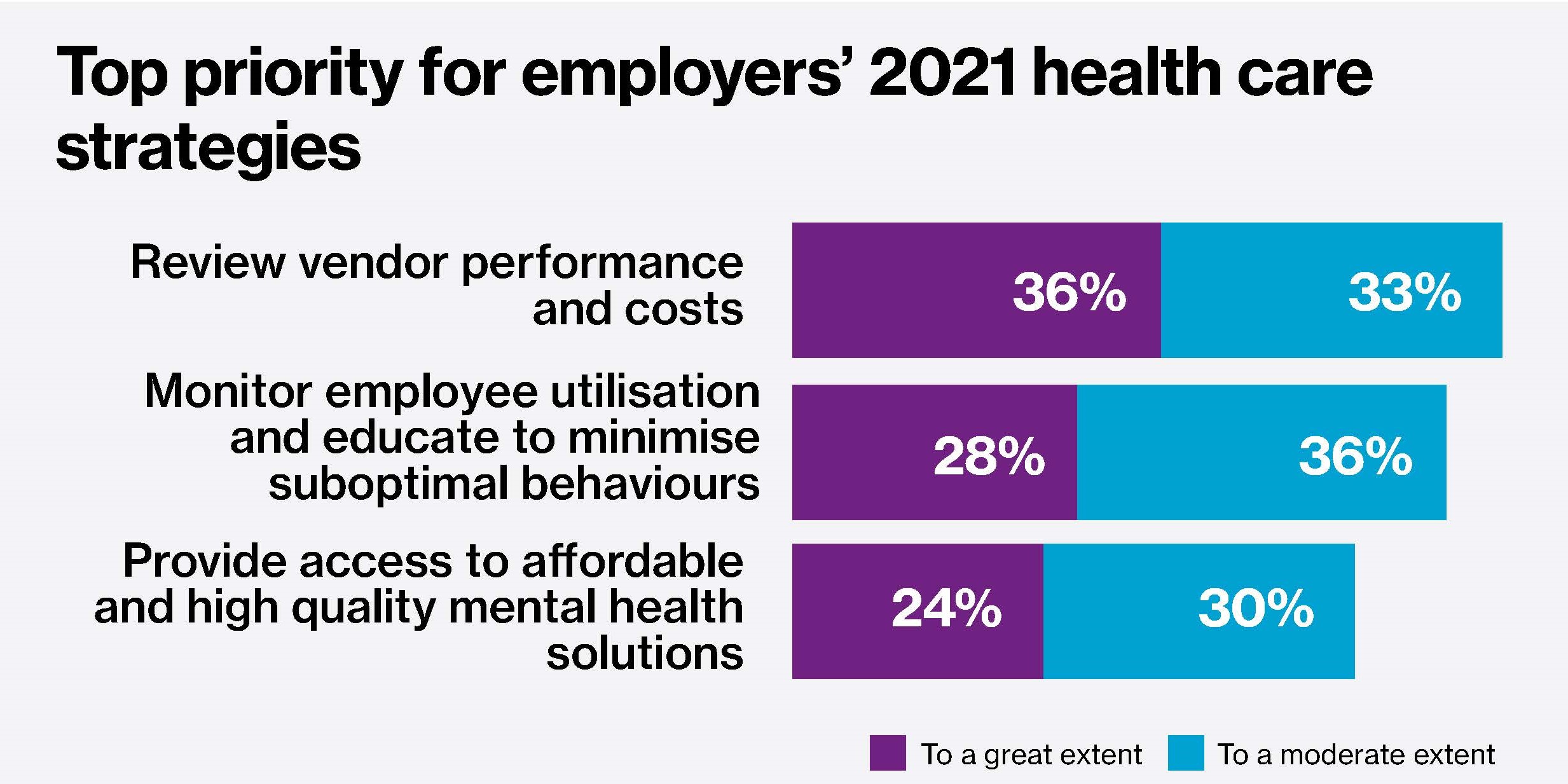Willis Towers Watson survey also finds companies reviewing their 2021 healthcare strategy and prioritising high quality mental health solutions
ASIA PACIFIC, 22 July 2020 – As companies in Asia Pacific start to restore stability for their businesses and employees, many organisations are proactively enhancing their healthcare and wellbeing programmes according to a new survey examining the business impact of Covid-19 on benefits by Willis Towers Watson (NASDAQ: WLTW), a leading global advisory, broking and solutions company. The survey, conducted in June, found that almost half of the companies anticipate a moderate to large negative impact on their business in the next year, and have already taken or plan to make changes to their benefits programmes.
To cope with the likely prolonged economic challenges ahead, half of the organisations have taken actions to reduce cost through actions such as hiring freeze, while others are considering to take further steps such as furloughs (16%), workforce reduction (21%), reducing or delaying merit increases (23%), salary freeze (13%), salary reduction (10%) and reducing annual bonus accruals (26%) for the remainder of 2020.
During this difficult time, supporting physical and emotional health has come up as a top priority for most employers. Half of the respondents have already or plan to make changes to their benefits programmes. Companies that have had a negative impact from the pandemic are more likely than those who have been less affected to change course.
“By taking positive actions around health and wellbeing, companies are putting people first, and that’s an investment that’s likely to build employee loyalty, raise engagement and enhance productivity”
Cedric Luah,
MD and Head of Health & Benefits, Asia and Australasia.
“We find it heartening that employers are actively looking at ways and doing what they can to support their workers despite facing significant challenges. By taking positive actions around health and wellbeing, companies are putting people first, and that’s an investment that’s likely to build employee loyalty, raise engagement and enhance productivity,” said Cedric Luah, MD and Head of Health & Benefits, Asia and Australasia at Willis Towers Watson.
The survey found that one-third of the employers in Asia Pacific believe Covid-19 will have a moderate to large negative impact on employee wellbeing. Employers are looking at enhancing wellbeing programmes (40%) and health care benefits (23%). In particular, almost two in five employers plan to enhance mental health services and stress or resilience management for their employees over the next six months.
In Hong Kong, India, Malaysia, Philippines, Singapore and Thailand, more organisations have prioritised wellbeing programmes as one of the most important benefits over this year.
With the increased focus on wellbeing, more than 80% of organisations have promoted Employee Assistance Programme (EAP) and online emotional/mental health services for their employees during the pandemic. Almost three-quarters (72%) have also prioritised communicating about wellbeing apps to support their workforce in maintaining their physical and emotional wellbeing especially when they work-from-home. Employers have also been promoting telemedicine services (73%) to their employees.
In addition, companies are making it easier for employees to get help across all aspects of the wellbeing spectrum. Many are supporting their employees to alleviate anxiety through virtual interactions such as:
“More than half of the companies we surveyed plan to prioritise access to high quality mental health solutions for their employees next year”
Pheona Chua,
Regional Sales Consultant, Corporate Health & Welbeing, Asia and Australasia.
“The pandemic has led to a much higher level of employee anxiety and stress, so most employers are focused on promoting or enhancing their current wellbeing programmes from now until 2021. More than half of the companies we surveyed plan to prioritise access to high quality mental health solutions for their employees next year. Our study also tells us that more that 50% of companies in Asia Pacific are likely to include telecommuting as an essential work arrangement option for the remainder of this year. Hence, some employers may want to look at broadening its current programmes such as enhancing virtual care or helping their employees to set up an ergonomic workstation at home,” said Pheona Chua, Regional Senior Consultant, Corporate Health & Wellbeing, Asia & Australasia, Willis Towers Watson.
“With the ongoing pandemic, employers should review their vendor performance and costs, while also monitor the employee utilitisation of benefits. Companies can expect health care, sick leave and disability costs to continue to rise later this year and into the next year. Two-fifths of the employers are also planning to revise their 2021 healthcare strategy,” added Cedric.

A total of 746 employers in Asia Pacific participated in the 2020 Restoring Stability survey, which was conducted during the week of 1 to 12 June 2020. Respondents employ nearly 1.6 million employees from multiple countries including Australia, China, Hong Kong, India, Indonesia, Japan, Malaysia, Myanmar, New Zealand, Philippines, Singapore, South Korea, Taiwan, Thailand and Vietnam, across various industries.
Willis Towers Watson (NASDAQ: WLTW) is a leading global advisory, broking and solutions company that helps clients around the world turn risk into a path for growth. With roots dating to 1828, Willis Towers Watson has 45,000 employees serving more than 140 countries and markets. We design and deliver solutions that manage risk, optimise benefits, cultivate talent, and expand the power of capital to protect and strengthen institutions and individuals. Our unique perspective allows us to see the critical intersections between talent, assets and ideas – the dynamic formula that drives business performance. Together, we unlock potential.